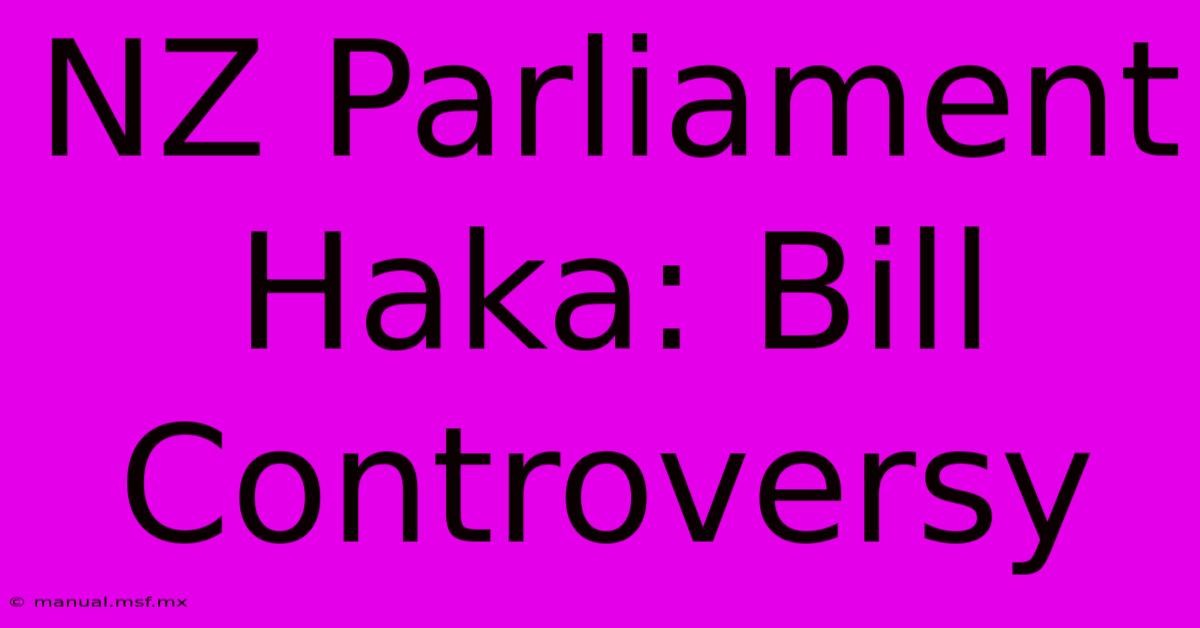NZ Parliament Haka: Bill Controversy

Discover more detailed and exciting information on our website. Click the link below to start your adventure: Visit Best Website. Don't miss out!
Table of Contents
NZ Parliament Haka: Bill Controversy - A Deep Dive into the Debate
Should the traditional Maori war dance, the haka, be performed by politicians in the New Zealand Parliament? This question has sparked heated debate, with a recent bill proposing to make the haka a formal part of parliamentary proceedings.
Editor Note: The "NZ Parliament Haka Bill" has ignited a firestorm of conversation, highlighting the complexities of cultural expression in a modern, multicultural society. This debate raises critical questions about respecting tradition, upholding inclusivity, and navigating the delicate balance between cultural heritage and political symbolism.
The bill proposes that the haka be performed by members of parliament before official sittings, a move intended to acknowledge the significance of Maori culture in New Zealand's history and identity. Supporters argue that it is a powerful symbol of unity and strength, while critics express concerns about its appropriative nature and the potential for exploitation.
Our Analysis: This article delves into the intricacies of the NZ Parliament Haka Bill, exploring its historical context, cultural significance, and the arguments for and against its implementation. We aim to provide a comprehensive overview of the debate, offering insights into the diverse perspectives and interpretations surrounding this controversial proposal.
Key Takeaways
| Aspect | Description |
|---|---|
| Historical Context | The haka's historical origins, evolution, and cultural significance within Maori communities. |
| Cultural Significance | The haka's meaning, symbolism, and traditional uses, including its role in ceremonies and warfare. |
| Political Implications | The potential impact of the bill on parliamentary proceedings, government policy, and public perception. |
| Ethical Considerations | The question of appropriative practices and the ethical implications of using the haka in a political context. |
NZ Parliament Haka: A Deeper Dive
Historical Context: The haka is a powerful traditional Maori war dance that has been practiced for centuries. Its origins are deeply rooted in Maori culture, signifying strength, unity, and a challenge to opponents. In traditional Maori society, the haka served as a powerful tool for communication, conveying messages of defiance, respect, and a readiness for battle.
Cultural Significance: The haka transcends its traditional warrior roots. It embodies a unique combination of physical strength, emotional intensity, and cultural pride. The movements, vocalizations, and facial expressions communicate a powerful message of unity, courage, and a connection to ancestral spirits.
Political Implications: The proposed bill has sparked a lively debate about the role of tradition and culture in modern politics. Supporters argue that incorporating the haka into parliamentary proceedings would be a powerful symbol of inclusivity and respect for Maori culture. Conversely, critics argue that it could be seen as a symbolic gesture that masks deeper societal inequities and fails to address the underlying challenges faced by Maori communities.
Ethical Considerations: The debate raises fundamental questions about cultural appropriation and the ethical use of traditional practices in a modern context. Critics argue that the haka is a sacred ritual with deep cultural meaning and that its use in a political setting could trivialize its significance and exploit its power.
Appropriation and Representation: The question of appropriation is particularly complex, as it raises concerns about the representation and authenticity of the haka when performed by non-Maori individuals. Some argue that it is essential to ensure that the performance is respectful and authentic, while others maintain that any attempt to perform the haka by non-Maori individuals inevitably falls short of true cultural understanding.
Conclusion: The NZ Parliament Haka Bill is a complex and multifaceted issue that necessitates a nuanced and sensitive approach. It highlights the importance of recognizing the cultural significance of traditions while simultaneously navigating the ethical considerations surrounding appropriation and representation. The debate underscores the need for ongoing dialogue and understanding to bridge cultural divides and create a more inclusive society that values and respects its diverse heritage.

Thank you for visiting our website wich cover about NZ Parliament Haka: Bill Controversy . We hope the information provided has been useful to you. Feel free to contact us if you have any questions or need further assistance. See you next time and dont miss to bookmark.
Also read the following articles
| Article Title | Date |
|---|---|
| Infowars Assets Sold To Onion | Nov 15, 2024 |
| Hospital Rally Delivering An Sos Message | Nov 15, 2024 |
| Live Kampf Mike Tyson Vs Jake Paul | Nov 15, 2024 |
| Torontos Royal Welcome For Pop Star | Nov 15, 2024 |
| Ford Bromsar Produktion Varfoer | Nov 15, 2024 |
| Resmi Foto Ole Romeny Periksa Di Indonesia | Nov 15, 2024 |
| Miastko W Obiektywie Fotografie Dawnych Lat | Nov 15, 2024 |
| Forlan Van Voetbalheld Tot Tennisser | Nov 15, 2024 |
| Argentina Loses To Paraguay In World Cup Match | Nov 15, 2024 |
| Afl Jerseys Wtf Design Debated | Nov 15, 2024 |
